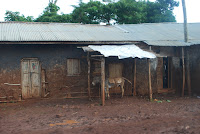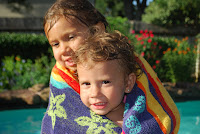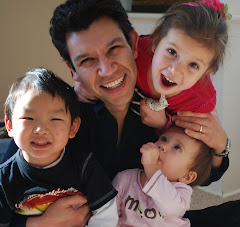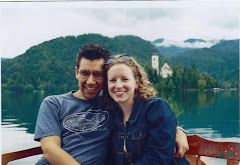
Leaving for our Omo Valley trip, we drove from our hotel near the airport, south out of Addis Ababa. As it was Sunday, we passed the huge Ethiopian Orthodox Church, and saw crowds of women dressed in white veils and white shammas. Our guide tells us that around 70% of Addis is Orthodox Christian and the rest is Muslim. The sweet smell of mangos and bananas wafted from the numerous fruit markets, while moms rushed around the streets carrying babies on their backs or baskets on their heads. Little kids shining shoes surely had their hands full as some of the sidewalks and side streets were dusty and unpaved. Throngs of people (and animals) were walking along the street everywhere- as we found out is the case throughout Ethiopia. In one poor neighborhood, corrugated metal houses crammed together, busting with children playing soccer in the nearby fields. It seemed that half of the city was under construction, with skeletons of eucalyptus scaffolding precariously wrapping the cement structures.
Two streets over a new neighborhood of mansions was being constructed: monstrous structures with high arched windows, surrounded by high walls topped with chards of glass to protect its inhabitants. Beyond the wealthy area, hundreds of government subsidized apartments extended as far as we could see, like blocks of grey legos waiting for their cheery paint. Later in our trip we would see governmental commerials that advertise "50,000 new residents will enjoy cobblestone streets." We saw microbuses packed with people, a taxi loaded with chat bundles (the legal hallucinogenic drug), and several more “traditional,” animal- powered taxis. It seems to be that horses pull carts of people, while they prefer donkeys to pull carts of goods. Once we left the outskirts of Addis, the modern construction was replaced by mud and straw huts. The aroma of the eucalyptus trees and views of the cloud topped mountains calmed our nerves, and assured us we knew this was the start of a fabulous trip. We said good-bye to the city, and hello to the green, lush countryside.



The highway was paved for a while, and we could drive very fast in between herds of animals. I still cannot believe the amount of animals lazily walking on the road (ON the main road). In Latin America, and even rural Ireland or Spain, you might find some sheep or cows on the road. Nothing compares to the amount of goat and cattle we see in Ethiopia. I asked Yosef (our guide and driver) what would happen if he would accidentally hit one of these hundreds of animals that are walking on, sleeping on, standing on, or darting out in front of us on the highway. He told us he would have to pay the family, and in fact did pay a family one time for a baby goat that he hit. “I go free only when I hit a street dog.” Fortunately we rarely see dogs outside of Addis, which I thought was odd because in other countries dogs seem to outnumber farm animals sometimes. Herding these animals are boys, from age 7 up, although sometimes a little guy will follow around his dad. Something that made me extremely nervous as a mom was seeing little kids (ages 2-5) playing in or near the highway. I know there is only 1 car passing every 5-10 minutes, but the speed at which they pass these sweeties is too dangerous!



The highway was paved for a while, and we could drive very fast in between herds of animals. I still cannot believe the amount of animals lazily walking on the road (ON the main road). In Latin America, and even rural Ireland or Spain, you might find some sheep or cows on the road. Nothing compares to the amount of goat and cattle we see in Ethiopia. I asked Yosef (our guide and driver) what would happen if he would accidentally hit one of these hundreds of animals that are walking on, sleeping on, standing on, or darting out in front of us on the highway. He told us he would have to pay the family, and in fact did pay a family one time for a baby goat that he hit. “I go free only when I hit a street dog.” Fortunately we rarely see dogs outside of Addis, which I thought was odd because in other countries dogs seem to outnumber farm animals sometimes. Herding these animals are boys, from age 7 up, although sometimes a little guy will follow around his dad. Something that made me extremely nervous as a mom was seeing little kids (ages 2-5) playing in or near the highway. I know there is only 1 car passing every 5-10 minutes, but the speed at which they pass these sweeties is too dangerous!


About a half an hour outside of Addis we came to a small village. There were many donkeys wearing a wooden tray in the shape of an upside-down V, on their backs. In the trays, were bright yellow, plastic containers carrying water from the well/river. Many of these yellow jugs originally held cooking oil, and now were being recycled to transport water, since they were much lighter than traditional clay pots and could carry more than calabashes. In the ditches and muddy streams, we passed children laughing and splashing while their moms washed clothes or bathed themselves.




There were 3 types of huts we observed in the Oromo tribe: a round mud/straw base with a thatched roof; a kind-of triangle house made of long and skinny sticks for the base with a corrugated metal roof; or an A-line house, built with a combination of long and skinny sticks, covered with the mud/straw mixture, topped with a corrugated metal roof. The huts were dotted near the main road, and then the fields spread out like a yellow (dried harvest), green (current harvest) and red (soil) patchwork quilt. The farmers in this southern region plant sorghum, corn, barley and wheat (no teff grows here! The injera in the south many times does not contain teff!). Sorghum has the same structure as corn (tall stalks), but does not have a “fruit” like corn. Instead, what they harvest is the top grassy part, which is reddish brown (compared to the yellow corn tassel). In our whole journey from Addis and through the Omo Valley, we saw thousands of farms… and yet we never saw a single piece of machinery. No tractors, none of those moveable irrigators, no farming equipment at all. We saw men or boys behind oxen ploughing, and we saw women and men with hand tools (which I don’t even have the vocabulary for) working in the fields.



We stopped for tea and a restroom break at Butajira, and noticed that the only cars around were muddy 4x4s. Yosef told us that Toyotas are the most popular cars for driving outside of the cities, and that Toyota even builds their 4x4s with “African” specifications, which are much tougher than American/European specs because these SUVs are actually driving through riverbeds, and crossing rocky, rough terrain (and not paved suburban streets).
*
After Butajira, we passed through Guragi territory, where there are more Muslims than in other areas. We were told by Yosef that this tribe was known for being very hard workers, however I think that you can extend this stereotype to all of the Ethiopians that we saw. I personally was amazed at the strength of the women. You know the old “I walked to school barefoot, uphill both ways” story? These women were carrying huge bundles of sticks, straw, stalks, and were indeed walking miles barefoot, and uphill. Tonio kept joking that I have it too easy, but there is the realization that he is completely right: we have it so easy. I several pregnant women doing the same work, and one woman carried the bundle of wood on her back, and her baby was perched (almost impossibly) on top! Here are some women carrying injera to sell in the market:

Each of the tribes has their own language, traditions, way of dress, and culture. Sometimes it took us a minute to pass through the lands of a tribe, and other times it took us hours. Yosef told us that although Ethiopia holds a plethora of tribes and diverse people, the years under Selassie and even the communists created a very strong national unity. Ethiopians are proud of their differences, proud of their culture, and are very patriotic Africans. We passed through the Silte (pronounced sill-tay) people, and the Hadiyyi tribe, and then arrived in Sodo. Just outside the town, we came across a tree that must have had 30-40 nests hanging from it. Flying in and out of these balls of straw were brilliant yellow birds singing and fluttering about.




I think our Jeep smiled as we transitioned onto a very bumpy road. Remember the dry, famished Ethiopia you saw on the news in the 80’s and 90’s? Throw it all out the window and rethink your image. This is the lush, green cloud forest we were driving through in Southern Ethiopia. The smell of cool humidity overwhelmed the car and we awed at the fertile valley, telling Yosef over and over “this is not how we imagined Ethiopia,” as he knowingly nodded his head. We passed the Gammo people, part of the Dorze tribe. Men were picking cotton, women were drying clothes over wooden fences, and children were jumping over sticks laid on the ground in a game similar to hopscotch.




Yosef knows people everywhere, and had arranged for his friend to be our local guide in Dorze. On our drive, I thought I was looking at fields of bananas (haha, now that I am the expert on bananas since we have some in our garden). It turns out I was wrong, and the plant is rightfully named “False banana.” We were told that bananas do not grow in this high altitude.

The Dorze take full advantage of the false banana tree, and use it in constructing their unique houses, as well as for a food. Their houses are the shape of an elephant’s head, because a long time ago elephants roamed here. (side note- Yosef told us that during the communist regime, the Kenyans came in helicopters and herded the elephants into Kenya where they now live on reserves. He claims that the communists did nothing, and now Kenya was reaping the benefits, ie tourism dollars). Anyway, so the Dorze huts look like elephants with the 2 upper windows being the eyes, and the hump of a trunk coming down over the door. They are built with bamboo, and topped with the leaves of false banana trees.


Termites begin to eat the huts from the bottom almost immediately. The Dorze purposely build the huts 12 meters high, knowing that the houses will gradually become shorter as the termites chew the bamboo from the ground up. You can see on the right, the hut that used to be 12 meters is now very short and is used for someone’s grandfather now. The hut on the left was recently built and is 12 meters high. Isn’t that crazy!? It takes 3 months for 6 people to build it, and then they change roofs/covers every 5-10 years. The houses last for 60 years, and are rainproof and moveable (although it takes 50-60 men to pick them up and move them). Usually, when people get married, the men inherit the land from their parents, and the Dorze build them a small hut called a “honeymoon hut” that they use for the first 3 months of marriage. Then they build the large one, complete with storage rooms, bunk beds (bottom for parents, top for kids), kitchen, coffee area, and beer making area. On the backside of the hut, on the picture to the right, you can see the large clay urns that held fermenting ground maize and wheat, on its way to becoming a local beer.


When we came inside, it took a minute for our eyes to get adjusted to the blackness. The walls were lined with calabashes (aka Et tupperware), used for drinking and holding liquids, brooms, and the seats were bamboo frames covered with goat skins. In the center of the hut was a small place for a fire, where they would brew the ubiquitous coffee.


There are about 7300 Dorze in this village, but many more in the farther territory. The Dorze are Orthodox Christians, and have many religious ceremonies. Their biggest festivals are on Sept 11 (New Years), Christmas, and Easter, which they celebrate with family and friends, and lots of eating (such as chicken doro wat) and drinking (their homemade beer or liquor). We heard singing in their church, and saw the cemetery in the forest. They are famous for their farming, weaving cotton into shammas and scarves, and making pottery, and each person is responsible for one of these. The cotton production is a family affair: the kids are in charge of taking out the seeds, the women spin the thread, and the men weave the blankets or shammas. When not bright white, the thread is dyed using local flowers in brilliant colors. They organized a weaving co-op in the town and work collectively to produce beautiful products.


Unlike in other parts of Ethiopia, where teff flour is made into injera daily, the Dorze make their bread from “quoitcho,” which I am probably spelling wrong. Taking the leaf of a false banana, the woman begins to scrape the stem. The dry fibers are used for rope.
She then takes the juicy bits (which smelled like fresh leaves) and bury them in a false banana leaf, 1 meter down, for 3 months. We were told “when it ferments, and smells like rotten cheese, you take it out.” They showed us how it smelled (they were right), and how she can mix it with water to make a dough, sometimes they also mix in other flours.
They cook it on a hot comal (OK, comals are Mexican but I don’t know what else to call it), wrapped in a false banana leaf, over a fire. Then they just take off the banana leaf and cook it a bit more on each side, and when it’s finished it reminds me of a thick tortilla! How was this invented? Who came up with this!? It tasted really good though, not at all how it smelled when they unburied it.
The great part about the false banana is that it provides shelter (the dried leaves make the cover of their hut), food (their bread, plus the root is made into a porridge), food for their animals (who eat the flower/fruit), rope (the leftover fibers), umbrellas (they make out of the leaves)… and it can survive a drought of 3-4 months because it has the ability to store rain in its trunk! Pretty amazing.


With the quoitcho bread, we tasted some pretty awful distilled liquor (no offense Dorze people!). The spicy, firey chiles they used in the salsa we ate with the quoitcho burned all the way down, and continued "working" for what seemed like forever:). Tonio enjoyed picante sauce as he wiped away the sweat from his brow. I was laughing when they said they always drink the homemade brew with their raw meat dishes, because it kills whatever bad bacteria or parasites are around! (I remember a similar story in Slovenia about the local slivovitz being used to treat stomach ailments). They also drink this “aragay” in the morning to warm up- Dorze was high enough in the mountains to have a cool temperature year round. I was actually cold at night with my jeans and fleece on! We walked around the Dorze village with our guide, and he showed us his house, and introduced us to his mom, his grandfather, and baby sister. Some kids followed us around the village and sold us some traditional instruments that they made.






The kids tried to show us a game involving a wooden tablet with 12 holes, and 4 stones each. That’s about as far as they got before they started speaking in their own language and flipping stones around. They also showed us instruments they made (and we bought), and some leopard skins (whaaat?). These 10 year old twins wouldn’t let go of my arm and followed us through the village in the evening, and came to visit again in the morning. The kids love talking about the World Cup, and all want an African team to win (Cote d’Ivoire seems to be the favorite). They told us they love to play football (soccer), and asked excitedly if we had a soccer ball to play with them. We told them no, and they said they didn’t have one either, and in the end we gave them money to buy a football.


For dinner we had separate dishes of beets, spinach, spicy small beans, cabbage, pasta with tomato sauce, injera, and bread. It was sooooooooo good. When we finally made our way to our own little Dorze hut for the night, we closed the door and found a huge spider on the back of it. Tonio killed it, and then we proceeded to check the blankets, sheets, bed, floor, for any more of its spider friends, while Tonio sang “The Itsy-Bitsy Spider.” We didn’t find any (phew!).


With the quoitcho bread, we tasted some pretty awful distilled liquor (no offense Dorze people!). The spicy, firey chiles they used in the salsa we ate with the quoitcho burned all the way down, and continued "working" for what seemed like forever:). Tonio enjoyed picante sauce as he wiped away the sweat from his brow. I was laughing when they said they always drink the homemade brew with their raw meat dishes, because it kills whatever bad bacteria or parasites are around! (I remember a similar story in Slovenia about the local slivovitz being used to treat stomach ailments). They also drink this “aragay” in the morning to warm up- Dorze was high enough in the mountains to have a cool temperature year round. I was actually cold at night with my jeans and fleece on! We walked around the Dorze village with our guide, and he showed us his house, and introduced us to his mom, his grandfather, and baby sister. Some kids followed us around the village and sold us some traditional instruments that they made.






The kids tried to show us a game involving a wooden tablet with 12 holes, and 4 stones each. That’s about as far as they got before they started speaking in their own language and flipping stones around. They also showed us instruments they made (and we bought), and some leopard skins (whaaat?). These 10 year old twins wouldn’t let go of my arm and followed us through the village in the evening, and came to visit again in the morning. The kids love talking about the World Cup, and all want an African team to win (Cote d’Ivoire seems to be the favorite). They told us they love to play football (soccer), and asked excitedly if we had a soccer ball to play with them. We told them no, and they said they didn’t have one either, and in the end we gave them money to buy a football.


For dinner we had separate dishes of beets, spinach, spicy small beans, cabbage, pasta with tomato sauce, injera, and bread. It was sooooooooo good. When we finally made our way to our own little Dorze hut for the night, we closed the door and found a huge spider on the back of it. Tonio killed it, and then we proceeded to check the blankets, sheets, bed, floor, for any more of its spider friends, while Tonio sang “The Itsy-Bitsy Spider.” We didn’t find any (phew!).


On the way to the bathroom (a walk in the pitch black to a pitch black hole in the ground) I told Tonio “Oh! I thought I just saw a leopard!” to which he replied “Oh, leopards are easy! You just have to walk backwards. Spiders sneak up on you when you’re sleeping!” I think I was overtired and slap-happy because I couldn’t stop laughing until we were in bed. Walk backwards. Heehee.

















































